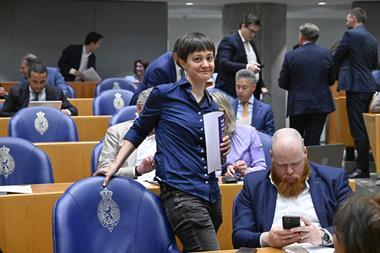Cyprus-based LifeGoals Financial Services is urging EU policymakers to transform the Pan-European Personal Pension Product (PEPP) into a workplace retirement savings vehicle, rather than creating a separate Pan-European Occupational Pension Product (PEOP).
In a position paper published ahead of the European Commission’s scheduled review of the PEPP in Q4, LifeGoals proposes expanding the product’s framework to accommodate employer contributions, with clear parameters for tax incentives, matching arrangements, and workplace implementation.
The firm argues that a broader PEPP could effectively meet the needs of both individual savers and employers, particularly small and medium-sized enterprises (SMEs) that lack the scale to establish and manage an Institution for Occupational Retirement Provision (IORP).
“The proposals in our position paper are not radical – they are practical, proportionate, and aligned with the EU’s long-term goals, from strengthening the Capital Markets Union to improving retirement outcomes,” said Michael Hadjihannas, chief executive officer of LifeGoals.

“We propose these changes to support the broad adoption of the product. These issues don’t just affect providers, they ultimately limit access and benefit for European savers,” he added.
LifeGoals was the second provider in the EU to launch a PEPP, following Slovak fintech Finax, which has also advocated for opening the product to workplace use.
LifeGoals is now developing a blueprint to demonstrate how a combined occupational and individual PEPP could operate in practice.
Structural and regulatory barriers
Its position paper highlights several structural and regulatory barriers hindering wider take-up. Chief among them is the existing 1% fee cap, which includes operational, distribution, advisory, reporting and investment costs.
LifeGoals argues that this constraint limits the ability to incorporate higher-cost private market strategies that could enhance long-term returns and contribute to financing the real economy.
In addition, LifeGoals noted that PEPP providers face significant operational costs when delivering investment advice, which triggers a suitability assessment under current rules. This requirement, the firm said, creates friction for first-time savers and low-income individuals, potentially limiting adoption.
To address this, LifeGoals proposes exempting basic PEPP products from suitability requirements when no investment decision is made by the saver.
The paper also calls for a uniform implementation framework across member states, citing the administrative burden of establishing national sub-accounts as a further obstacle.
Divergent tax treatment of PEPPs across jurisdictions, as well as inconsistent application of VAT, also create a fragmented playing field and disincentivise new market entrants, the firm said.
LifeGoals is urging member states to coordinate efforts to promote the benefits of the PEPP – such as cross-border portability and ESG integration – to boost awareness and adoption.
“The upcoming [PEPP] revision is a crucial opportunity, if Europe wants the PEPP to succeed as a scalable, inclusive, and modern pension vehicle,” Hadjihannas said.
The latest digital edition of IPE’s magazine is now available
Supporting documents
Click link to download and view these files























No comments yet